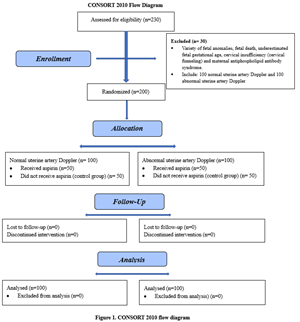Effect of Low Dose Aspirin Administration in Idioipathic Alpha-fetoprotein Elevation
Main Article Content
Abstract
Objective: This study aims to evaluate the outcome of low-dose aspirin administration in complicated pregnancies with idiopathic alpha-fetoprotein (AFP) elevation. Methods: In this randomized controlled trial, 200 participants with singleton pregnancies presenting with idiopathic elevated alpha-fetoprotein (AFP>2 multiples of the median (MoM)) were recruited. Patients in their 16th to 20th week underwent ultrasonography and Doppler imaging as diagnostic tests. Based on the results of the diagnostic tests, patients were divided into two groups. Normal uterine artery Doppler group (N=100) and Abnormal group(N=100). patients divided into two groups in terms of aspirin intake. Primary complications included preterm delivery, fetal death, intrauterine growth restriction (IUGR), preeclampsia and neonatal hospitalization. Results: From May 2015 through June 2016, 200 women were randomized as follows: 100 to 80 mg ASA tab; 100 to no treatment. Most characteristics were similar across groups. The risk of the IUGR was 2% versus 14% p-value: 0.027, the risk of preterm labor and Neonatal hospitalization were also less, but the risk of IUFD and preeclampsia did not change. Conclusion: Administration of low dose of aspirin can have prophylactic effects against some adverse outcomes in complicated pregnancies presenting with elevated alpha-fetoprotein levels.
Article Details

This work is licensed under a Creative Commons Attribution 4.0 International License.
